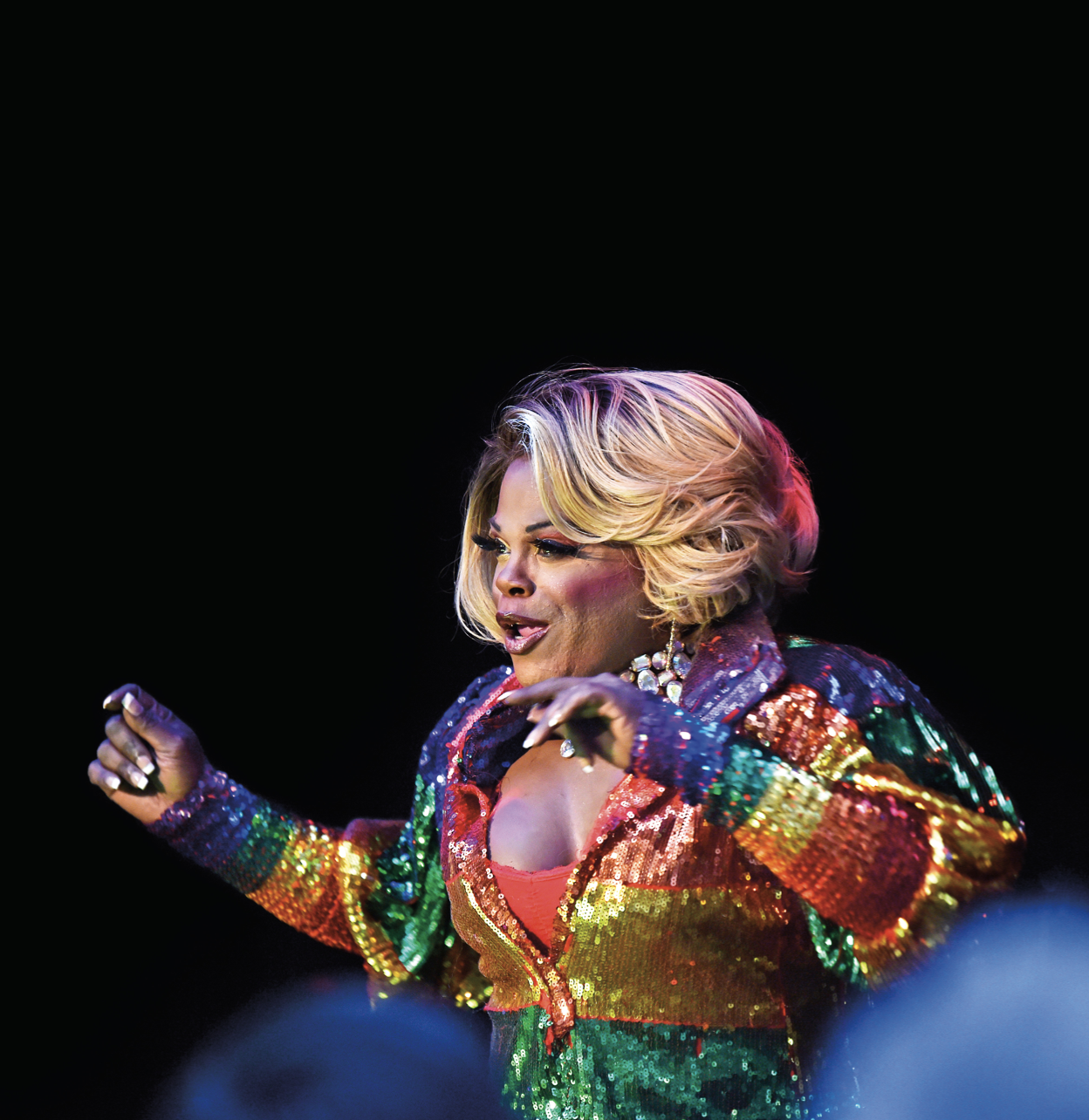
Rehoboth audiences are expressing their love for drag performers. (The feeling is mutual.)
By Jeanne Shook
Photograph by Butch Comegys
From the September 2022 issue

For renowned Rehoboth drag queen Roxy Overbrooke, it all began ahead of a New Year’s Eve “celebrity” costume party almost 20 years ago. “I could not figure out a male celebrity I wanted to be,” recalls Charles Bounds (aka Roxy). At the urging of a friend, he decided to dress as a female and ended up decked out as Billie Holiday. Already a singer at weddings and private events, Bounds sang a few numbers at the party, and a drag star was born.
The Rehoboth-area resident began performing drag as a side hustle, maintaining two other jobs in retail and hospitality in order to fund a growing wardrobe, a necessity that comes with the territory. “Just about everything I wear is custom made. … It’s very expensive,” he notes.
When all three jobs became too taxing and “drag was making me happy,” being Roxy became a full-time gig. You can find her four to five nights a week as the Blue Moon’s resident queen. In addition to performing, she serves as hostess and selects the evening’s lineup of performers. Unlike most drag queens, who lip sync, Roxy does her own singing, which she showcases at the Blue Moon’s drag shows and at her weekly cabaret there (a solo perfor-mance each Thursday billed as “A Night With Roxy”).
Roxy is part of a community of drag queens who perform regularly at various venues in coastal Delaware. “A close-knit sisterhood” is how Scott Beadle describes the group. Beadle has been performing in drag as Regina Cox for 37 years. The retired corporate training manager credits “Regina” (Latin for “queen”) for bringing out “my own personality. … I would not have excelled in my career without Regina.”
A bachelor’s degree in theater and years of experience on stage helped, too. For Beadle, it was the “costuming and creativity” and the ability for self-expression that attracted him to drag. Even though “drag allows you to kind of hide behind the face … your inner self comes out,” he explains.
True to its roots, drag is very theatrical, complete with costumes, makeup, wigs, a little attitude, a lot of fun and over-the-top exaggeration. This form of entertainment is nothing new. Male actors playing female roles predate Shakespeare’s time, when men cast as women wore costume dresses that would “drag” across the stage floor. What is new about drag is its mass appeal and the changing demographic of the audience.
Previously an evolving art form reserved for the LGBTQ community, drag’s dive into the mainstream is largely credited to one of the most famous drag queens of all, RuPaul Andre Charles — better known, simply, as RuPaul — with the 2009 debut of “RuPaul’s Drag Race,” a reality TV show.
“Drag is so popular, thanks to RuPaul. … Everybody wants to see it, but they don’t want to go to a show at midnight,” says Beadle. Nor do they have to. With early evening shows every Sunday at Shrimpy’s Bar & Grill in Midway, and Sunday brunches at The Pines, Goolee’s Grille and Port 251 (all in downtown Rehoboth), drag is no longer relegated to late-night shows and dark clubs.
“It’s not decadent — it’s an art form. … As long as everyone is respectful, we just want to perform,” says Beadle.
The onstage glitz and glamour, however, doesn’t always reflect what’s happening backstage. At Goolee’s Grille, where Regina hosts monthly Sunday brunches, “‘backstage’ is the kitchen. ... So many of the venues we perform in weren’t designed for that purpose.”
Blue Moon owner Tim Ragan, who presented his restaurant’s first drag show in 2005, recalls that performers “used to change on top of a freezer or in a storage room.” Eight years ago, he decided to add a bona fide dressing room and costume shop in order “to do this seriously.” Protecting “the value of the costumes was one thing,” Ragan adds, “but regular entertainers have a place to store their stuff.”
Expanding its appeal
Almost two decades later, “the oldest, longest-running continuous drag show in Rehoboth Beach” (as Ragan refers to it) got a boost from an unlikely source: COVID-19. Prior to the pandemic, entertainment consisted of a single show at 9:30 on Friday and Saturday nights, in the walk-up bar area, where food was not being served. According to Ragan, when eventual COVID restrictions required “putting people in seats, we couldn’t seat enough people in one show, so we went to a 7 p.m. and 9 p.m. format.” He adds that “people love it: They can make reservations, have dinner and see a show.”
The earlier show times attract a mix of audiences: gay and straight, young and old, moms and dads, kids and grandkids. Ragan cites the pandemic as “a game-changer that created a definite avenue for different demographics, bringing in people who are now more comfortable coming in.”
A regular performer at the Blue Moon, Jerome Simpson says his stage persona, Jenell Collins, “had to get used to the new dynamic,” one in which “you want to be good and ‘bad’ at the same time!”
Simpson first stepped onto the stage in 1989 while working as a bartender in Wilmington. When his boss demanded his participation in a charity drag show, Simpson wanted no part of it. But at the risk of losing his job, he created Jenell, whom he characterizes as a “firecracker of a powerhouse.” After that first performance, when asked if he would do another show, Simpson agreed. More than 30 years later, he’s turned that drag experience into a full-time career.
In addition to performing, the Rehoboth-area resident also helps design costumes for his fellow queens, working behind the scenes to add the proper hairpieces, wigs, jewelry and other accessories to “help them become perfect!”
While Simpson can sing live, lip-syncing allows him to create that “illusion/chameleon” quality that gives Jenell a broader repertoire of musical genres, from R&B to country. “And the better you are, the more you bring the crowd into what you’re doing,” he explains. “… You keep growing.”
As the popularity of drag continues to grow, so too, does the number of performance venues. “If people come in with an open mind, they will be blown away by the level of talent that some of us have,” says Bounds. Bottom line: It’s good for business. Just ask Bob Suppies, owner of The Pines.
When Suppies decided to add entertainment three years after The Pines opened its doors in 2018, he reached out to Kevin Buice, better known as Mona Lotts, a familiar face — and name — among local drag devotees. Mona, who began her drag career at the Blue Moon 18 years ago, recruited drag queen Kristina Kelly (Christopher Smith) and, together, they became the town’s dynamic duo of comedy and female impersonation.
What began as a random Saturday evening show became a permanent slot in The Pines’ entertainment schedule. Mona and Kristina, known for their ad-libbed repartee, serve as the “house queens,” inviting two or three guest performers to join them each week. Sold-out Saturday shows then gave birth to jam-packed Sunday brunch performances, which Suppies describes as “more family-friendly” than its “more flirtatious and risque” evening counterpart.
Buice sums up drag’s popularity quite simply: “The entertainment value is off the charts. Where else can you go to see great comedy, great music, great costumes? … We always try to make sure that people leave happy.”
Buice has served as mentor to many aspiring drag queens, including Brian Gray, who introduced his persona, Fancie P. Charmington, eight years ago. Fancie refers to Mona as her fairy godmother because “she would magically appear and help with hair and makeup.” And Regina is her drag “auntie.” On occasion, Fancie joins Mona and Kristina at The Pines; she’s also teamed up with Regina at Goolee’s.
Subjected to bullying as he was growing up, Gray gravitated toward theater in high school because it allowed him “to leave Brian backstage and become somebody else for a while, get applause and acceptance.”
According to Gray, Fancie — who describes herself as “a Southern girl wrapped in deliciousness” — personifies the “extreme exaggeration of a woman. … eye makeup three times the size of your eyeball, big hair, big jewelry. … It’s all an illusion. It’s just like theater.”
In the decades since Beadle began his drag career, “costumes and makeup have become more exaggerated,” he notes. On average, applying makeup can take up to two hours. When he first started performing, Beadle had a friend who taught him the basics, but the challenge is that “a man’s face is different from a woman’s face. … The way the skin lays, you have to change the structure of your face.” Fortunately, he adds, “makeup is becoming more refined, and people are learning the techniques to restructure their face.”
‘A source of empowerment’
But forget the backstage, back-stabbing drama of “RuPaul’s Drag Show.” That’s reality TV. “Here, there’s a sisterhood and camaraderie that we have,” says Beadle. “We all help each other out.” The veteran queens serve as role models, or drag moms, to the younger, up-and-coming queens, lending their support and dispensing advice on everything from makeup and wardrobe to song choices — even choosing a stage name.
With a little help from his friends, Tyrell “Ty” Boyer took to the stage after several drag moms encouraged him to give it a try. In 2010, after assisting many queens behind the scenes, he created his alter ego and stage persona, Tyra Parker, who struts her stuff at several area venues, including Shrimpy’s Bar & Grill.
When his seasonal job as a beach maintenance worker allows, Boyer trades his work boots for kinky boots, wearing “whatever’s flashy and what looks good on stage.” Performing to rap and hip-hop music, Tyra’s style has earned her billing as the “Ghetto Princess.”
The best advice Boyer ever received from his mentors? “Go on stage and give them your all, and don’t hold back. … But above all, present yourself with respect and dignity.”
Indeed, for the queens holding court in Rehoboth Beach, drag is more than a form of entertainment — it’s a source of empowerment. Bounds
refers to drag as his “superhero cape,” explaining that “you created that persona, and once you start to realize it, you know you can do anything. … That’s a very special place, a very powerful thing.”
He also debunks a common misconception about drag queens that “we’re not a full person outside of drag,” emphasizing that “Charles is a complete 100 percent entity apart from Roxy. … It’s something I do; it’s not who I am.”
Simpson chimes in, “Drag gives a person a voice where they might not have one. Come and see it. You’ll find power and strength in every show.”



